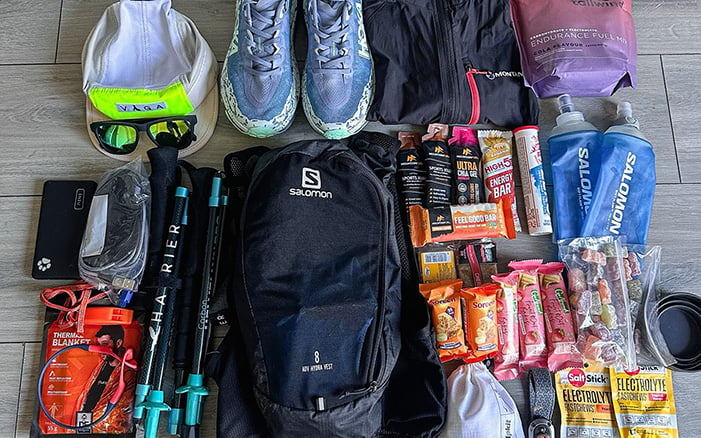The night before a race can feel like a chaotic mix of excitement and existential dread. Whether you're gunning for a PB or just hoping to finish strong, the right evening routine can help you start line-ready—and a little less stressed.
No need for rituals involving lucky socks and spaghetti towers—just a bit of planning, some calm, and trust in your training.
Here’s what to focus on when the countdown begins.
1. Lay out your gear
Nothing ruins a race morning like frantically searching for your left sock while chewing a banana. Take five minutes to lay out your full kit:
- Clothes
- Bib
- Safety pins
- Shoes
- Socks
- Watch
- Gels
- Headphones
- Throwaway layer
- Sunscreen
- Anti-chafe stick, etc.
Set it out like a “flat lay” on your floor or couch. Not only does it help you sleep better, it makes the morning feel like muscle memory. Snap a pic. You’ve earned it.
Related:Pack Like a Pro: Race-Day Gear Checklist

2. Eat a simple, familiar dinner
This is not the time to try spicy ramen, you know. Stick to what you know your stomach handles well. That usually means a mix of carbs, some protein, a bit of fat, and not too much fiber.
Pasta with tomato sauce, rice with chicken, a bagel with nut butter—basic, comforting, and proven. Save the feast for the finish line.
Related: 10 Foods and Drinks to Avoid Before Your Run: A Comprehensive Guide
3. Sip, don’t chug
You don’t need to “hydrate like crazy” the night before—that can actually backfire and send you to the bathroom all night. If you’ve been hydrating well during the week, just aim to sip water throughout the evening. A glass with dinner, maybe one more an hour later.
Skip the sports drinks unless you’re in hot conditions or a long race like a marathon. Trust your body’s signals.
4. Charge everything
There’s nothing worse than a dead watch on race morning—except maybe a dead phone and dead headphones too. Plug in everything before dinner: GPS watch, phone, wireless earbuds, and any battery packs. That way, you’re not scrambling in the dark or sitting in the car with a charger jammed into your knee.
5. Unwind your race brain
Nerves are normal, especially if this is your first race or your first race back after a break. The key is to actively unwind—not just avoid stress, but do something calming. That might mean a short walk, a warm shower, 5 minutes of easy stretching, or listening to a relaxing playlist.
If your thoughts are spinning, try journaling out your plan for the next morning.
6. Visualize the start line
Mental rehearsal can calm nerves and boost confidence. Close your eyes for a few minutes and imagine race morning: your breakfast, your warm-up jog, the sound of the starting gun, the rhythm of your stride. Picture yourself running smooth and strong.
You don’t need to script the whole race—just focus on the first 10–15 minutes going well. It works better than scrolling race hashtags at midnight.
7. Do a gear check (again)
Even if you laid it all out in #1, double-check. Is your watch charged? Did you attach your bib (and in the right spot)? Did you pack your warm layers for the start?
Review the race instructions, check the weather, and have your transport sorted.
Also, check the race’s social accounts for any last-minute updates—sometimes the course changes or the start time shifts due to weather, and you don’t want to find that out at the start line. Morning-you will appreciate your foresight.
8. Set five alarms—but maybe just two
Yes, it’s tempting to set alarms at 10-minute intervals, including one on your backup phone, your partner’s phone, and the microwave. But trust your main alarm (and maybe a backup) and resist the urge to check them all night.
Over-alarming usually means under-sleeping. Instead, remind yourself that even if you don’t sleep perfectly, you’ll still perform just fine.
9. Go to bed on time (but don’t panic if you can’t sleep)
Aim to be in bed a little earlier than usual, but don’t obsess over falling asleep. Pre-race nerves might keep you awake longer than you’d like—that’s normal. You can still race well on a restless night. Just resting and being horizontal still counts.
The key is to minimize stress and screen time, create a quiet space, and at least give yourself the chance to rest. One bad night won’t undo weeks of good training.
Read next: 20 Oddly Satisfying Rituals Runners Do on Race Day
Race day starts the night before
You don’t need a perfect routine—just a calm one. Control what you can, skip the drama, and trust that your training will carry you through. The night before is your time to slow down, check in, and line things up so the only thing left to do in the morning… is run.









